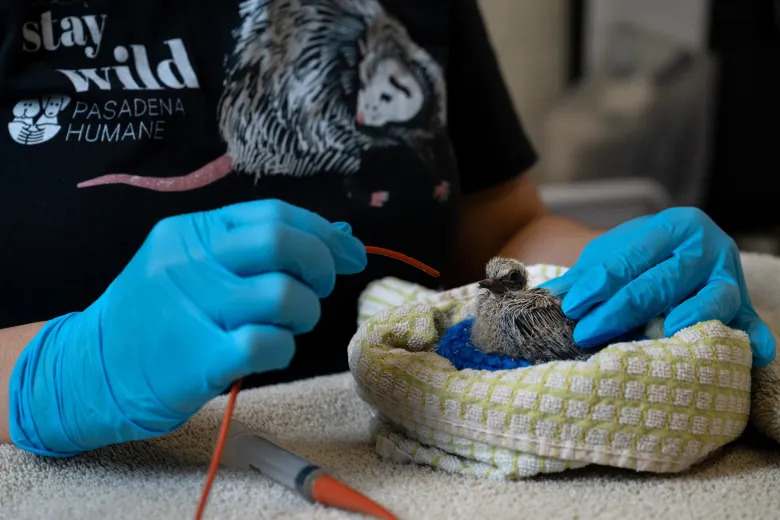Column: July 4th fireworks exciting, but traumatizing for pets and wildlife

A Pasadena Humane staff member prepares to feed an orphaned bird at its Sandra J. Goodspeed Wildlife Center. Birds are heavily impacted by 4th of July fireworks. They may flee their nest, leaving young ones behind, like this baby mourning dove. In 2023, Pasadena Humane admitted nearly 1,500 injured, ill and orphaned wild animals. Learn more about peaceful co-existence with our wild neighbors at pasadenahumane.org/wildlife
When I first moved to Pasadena from the East Coast five years ago, I found the 4th of July here shocking. In fact, I still do. The massive displays of illegal fireworks are not something I’m accustomed to.
Fireworks are challenging for pets everywhere, and in our area even more so. The unpredictable bursts and booms that seem to go on for days frighten our furry friends, making it more likely for them to flee in fear and go missing.
The 4th of July celebrations negatively impact more animals than just dogs and cats. Fireworks and increased human activity outdoors are highly disruptive to our wild neighbors, too.
Just as we see more lost pets entering the shelter surrounding Independence Day, our wildlife department is busier with helpline calls and intakes.
In the first two weeks of July last year, we saw 15% more vehicle collisions with wildlife and 9% more orphaned wild animals when compared to the last two weeks of July.
Lauren Hamlett, Pasadena Humane’s Director of Wildlife Education and Services, explains some of the reasons why the 4th of July festivities are dangerous and potentially deadly for wildlife.
For starters, animals stressed by the increased activity are more prone to illness and injury, and they may abandon their nest sites, dens, and other familiar environments.
Mammals fleeing holiday revelers and fireworks may accidentally run into more populated areas due to being disoriented. Wildlife sightings are likely to increase, as are conflicts with pets and vehicle collisions.
Fireworks are particularly harmful for birds. Startled birds are more likely to crash into buildings and windows as they attempt to flee. In some extreme cases, mass avian casualties have been reported related to fireworks.
Raptors (like hawks) may experience fireworks as a threat, which can cause them to abandon their home territories. They may become too disoriented to find their way back, leaving orphans in the nest.
When traumatized by fireworks, coastal birds sometimes fly so far away from shore that they don’t have the energy to fly back.
It’s not just the loud noise and vibrations that can harm wild animals. The debris left behind by fireworks may be mistaken as food by some mammals and birds, such as raccoons and pigeons. These adaptable animals — known as “generalists” rather than “specialists” — are not picky about what they eat.
When consumed, the debris presents a choking hazard and can get stuck in an animal’s digestive tract. The remains of fireworks also contain toxic chemicals that can poison animals when directly ingested or indirectly consumed through a water source.
The environmental impacts of fireworks should also be considered. Sparks and embers can set off wildfires and cause animals to bolt from their homes.
Pollutants released by fireworks (carbon dioxide, carbon monoxide, nitric oxide, nitrogen, ozone, sulfur dioxide, and particulate matter) endanger all animal populations and can cause respiratory issues and even death.
With all this in mind, we ask that you respectfully celebrate Independence Day this year. Refrain from setting off fireworks at home —yes, they are illegal in most places!
Keep your pets securely indoors and far away from official fireworks celebrations. This will help prevent your dog from going stray or experiencing unpleasant encounters with wildlife.
As always, ensure your pets are microchipped and wearing collars with a current ID tag. If your pets do get out, we want them to be returned to you as quickly as possible.
For more tips on peaceful co-existence with wildlife and pet safety on the 4th of July, visit pasadenahumane.org
Dia DuVernet is president and CEO of Pasadena Humane.
This blog post originally appeared as a column in the Pasadena Star-News on June 28, 2024.


